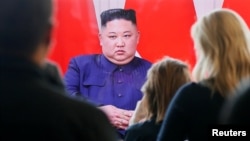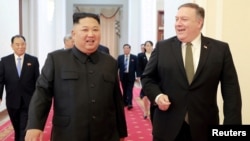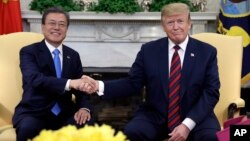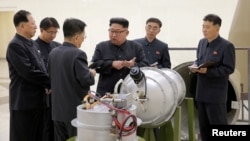As Kim Jong Un returns from a meeting with Russian President Vladimir Putin, questions linger as to the diplomatic support Kim garnered from Putin, and what will happen next in negotiations between Pyongyang and Washington. Meanwhile, a long-time observer of politics on the Korean Peninsula urges Washington and Seoul to re-examine the assumption underlying their strategy toward North Korea.
In interviews with U.S. lawmakers, one thing is clear: U.S. President Donald Trump and Secretary of State Mike Pompeo have some bipartisan support in their dealings with Pyongyang.
Ami Bera, a Democrat who represents California’s 7th congressional district and sits on the House Foreign Affairs Committee, says he supports Trump’s decision to walk away from his second meeting with Kim held in Vietnam, as well as his willingness to engage in direct dialogue with Pyongyang.
Let America decide who’s on our team
“I don’t think we’ll be telling Chairman Kim who he should send. I think it’s appropriate for President Trump to decide who’s going to negotiate on our side,” Bera said about North Korea’s wish that Secretary of State Mike Pompeo not lead future negotiations.
Mike Kelly, a Republican from Pennsylvania who sits on the House Ways and Means Committee, said Pompeo “knows what he’s doing, knows what his mission is, and is 100% supportive” of Trump’s strategy, adding “this is a guy who graduated No. 1 in his class at West Point,” instead of someone who “just walked in” without any background or knowledge about “how things work.”
Bera and Kelly, along with four other members of Congress, recently visited South Korea as co-chairs of the Congressional Study Group on Korea.
No distance between Washington and Seoul
Both told VOA they believe there is “no distance” between Seoul and Washington in dealing with North Korea, and they were reassured, after speaking with South Korea’s defense minister and U.S. commanders, that troop preparedness was “at the high level they’ve always been at.”
Kelly said he saw overwhelming support of Trump in South Korea, both in how he has dealt with Pyongyang and in his administration’s approach to the Asia Pacific region that is alarmed by China’s rise and long-term ambitions. It is a region the U.S. can’t afford to “walk away and become a secondary player,” he said.
A North Korea economic miracle?
Kelly and Bera said their trip reminded them of the success the country has achieved in just a few decades through the hard work of the Korean people, with help from the United States.
“Can you replicate that in the North?” Bera asked. While acknowledging North Korea may be starting from “a more difficult point,” he thinks it’s certainly possible.
The Korean Peninsula’s natural resources reside mostly in the north, which affords North Korea potential advantages in trade and commerce. However, in order to capitalize on these resources and harness the opportunity presented, authorities in Pyongyang will have to take a different approach “for it to work,” Kelly said.
As for talks between Washington and Pyongyang, Bera thinks a lot needs to happen “at the staff level.” He said there needs to be a lot of preparation before a third summit between Trump and Kim, including making sure “there is a mutually agreed upon goal of denuclearization” and a framework that supports the goal.
‘Kim will never give up nuclear weapons’
Such a framework doesn’t exist yet because the North Korean leader harbors no serious intent to give up nuclear weapons, said David Maxwell, a senior fellow at the Foundation for Defense of Democracies who specializes on national security.
“If he was serious (about denuclearization), he would have allowed working level negotiations to take place, he would have allowed development of a framework, process, and timeline for denuclearization,” Maxwell told VOA.
Maxwell thinks the basic premise that guides U.S. and South Korea’s current strategy toward Pyongyang is the assumption that “Kim can be co-opted or coerced into denuclearizing” and that the North Korean leader “will prioritize economic development over the retention of nuclear weapons.” Maxwell questions the validity of this assumption.
While acknowledging “none of us can know for sure what Kim Jong Un really intends and what he will do,” based on “historical record and Kim’s demonstrated action (or in this case non-action),” Maxwell thinks Pyongyang’s intent is to split the alliance between Washington and Seoul and get U.S. forces off the peninsula “as he believes the presence of U.S. forces provides (South Korea) access to U.S. nuclear weapons, even if there have not been any nuclear weapons in South Korea since 1991.”
Maxwell believes the U.S. should be “preparing for a Plan B that is based on Kim failing to denuclearize.”
Team America
“One of the things I really and most enjoy about being on the Foreign Affairs Committee is generally we have a bipartisan relationship,” Congressman Bera said. “Often we have differences on domestic issues and sometimes behind closed doors we’ll have vibrant dialogues on issues, but in general, those differences stop at the water’s edge when we approach the outside world.”
“If we don’t look at ourselves as Team America, as opposed to a Red Team or a Blue Team, it sends the worst message” to potential adversaries, Kelly said.
Kelly added that he and Bera don’t agree on everything.
“I think I’m more over the top for President Trump than Ami is,” he said. “I get that; I’m sure when President Obama was in office, I think he was a bigger fan than I was.”
The fact that lawmakers can “have different opinions and still come together and do the right things for the right reasons,” Kelly said, “is the beauty of it.”










